|
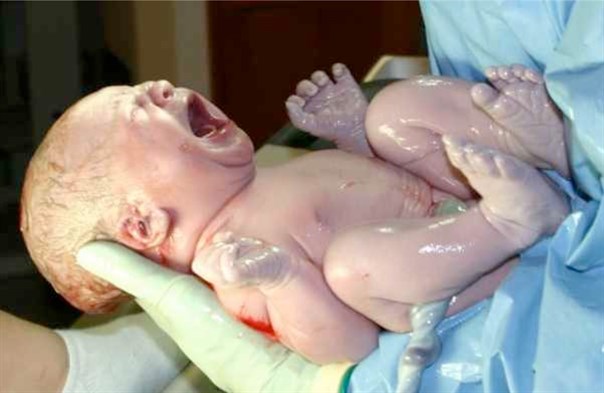 The Allergy Explosion The sudden upsurge of allergic conditions such as atopic eczema (skin allergy) and bronchial asthma in the past two decades is a well-recognised fact. The reason for this explosion in allergic conditions has been intensively investigated. Scientists and doctors have found a strong link between the absence of germs and infections in childhood and the subsequent development of an allergy. The immune system of the newborn baby needs germs to educate it in order for it to mature into a tolerant system. When the immune system does not mature appropriately, it can turn around and cause allergic inflammation instead. This leads to symptoms of allergy. The most powerful “education” of the immune system comes from the germs which colonise the baby’s intestinal tract at birth and during the early months of life. In fact there are studies which have found that the “education” by bacteria starts even before a baby is born. DNA from bacteria in a mother’s birth canal have been detected in the placenta and the presence of these bacterial genetic material influences how the newborn baby’s immune system matures the moment it is born. Click here to learn more about the link between bacteria and allergy What make today’s children more easily allergic? The following factors place babies and children at high risk of developing allergy: 1. having parents or close family members who are allergic 2. exposure to antibiotics during pregnancy and delivery 3. exposure to antibiotics in early life 4. delivery by Caesarean Section 5. inability to be fully breast fed 6. living in “clean environments” Today’s children, especially those living in towns and cities of prosperous countries, have less chance of suffering from infections compared to children in the past. At the same time, the trend to perform Caesarean Sections has also escalated. Babies who are born by Caesarean Section do not have the chance of taking in good germs from their mothers’ birth canal and have a very high risk of developing allergy. A survey in Holland noted that children who were born by Caesarean Section had at least 80% increased risk of developing asthma compared to those who were born naturally. 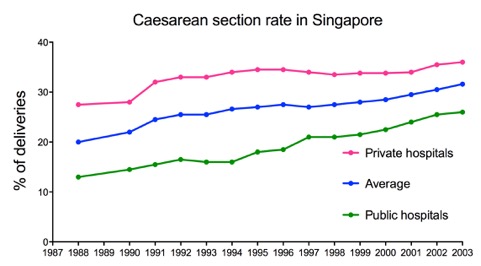
Caesarean Section rates in Singapore and Hong Kong between 1987 and 2003
Click here to read what a leading paediatric gastroenterologist, Dr. Carlos Lifschitz, has to say about using probiotics to benefit the infant who is born by Caesarean Section. The Allergic March Once a baby’s immune system becomes allergic it tends to continue being allergic throughout the rest of his or her life. This phenomenon of progression and persistence of allergy from infancy to adulthood is called the “Allergic March”. 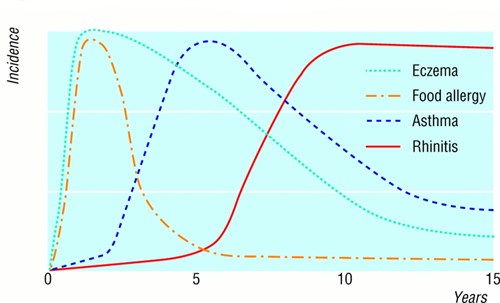
The “Allergic March” [Barneston and Rogers 2002]
 Doctors are faced with a major dilemma - how can we ensure a child receives the 'correct' immune stimulation from germs while at the same time, protect him or her from suffering from infections? The answer appears to be to strike a compromise - by letting children take 'good germs', i.e., probiotics. LACTOGG®’s probiotic strain stimulates the immune system safely, without causing infection, while educating it to mature and develop tolerance. An important landmark clinical trial was conducted in Finland where expectant mothers consumed Lactobacillus GG before delivery. After delivery, those mothers who went on to breastfeed their babies continued to consume this GG probiotic themselves for 6 months. For those babies who could not receive breast milk, the probiotic was fed to the babies directly for the same period of time. These babies were followed-up until they were 13 years old. It was found that in the babies who were exposed to LACTOGG®’s probiotic strain either directly or indirectly through breastfeeding, development of allergic eczema was reduced by 50% as compared to those babies who were not exposed. The protective effect of GG probiotic was still evident when the same group of children was tested at 4, and then again at 7 years old. This finding provided evidence that very early exposure to GG probiotic reduced the risk of a baby becoming allergic and that the protection was long term. This dramatic study demonstrated, for the first time, that we might actively prevent the development of allergy by making use of immune stimulation by one particular strain of probiotic, called Lactobacillus GG (ATCC 53103). Another group of researchers found that mothers who consumed GG probiotic before delivery until their babies were 6 months old had increased levels of an immune factor, called TGF-β2, in their breast milk. This immune factor suppressed allergic inflammation resulting in their breastfed babies having nearly 70% less risk of developing atopic eczema. 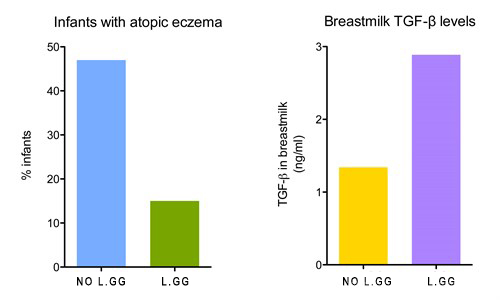
Percentage of breast-fed babies developing atopic eczema at 2 years old and concentration of anti-inflammatory immune factor, TGF-ОІ2 in breast milk.
[Rautava et al 2002] Exposing high risk babies to the beneficial effects of GG probiotic early in life, even during pregnancy, is an option to reduce their risk of becoming allergic. Hear what the experts say! In 2015 the World Allergy Organization formed a panel of allergy experts to evaluate all the evidence available in scientific and medical research on the use of probiotics in allergic disease prevention. The panel consisted of 25 world allergy experts from 22 allergy centres and universities, including an expert from Department of Primary Child Care, Children s Hospital, Chongqing Medical University, China. They examined the most significant clinical trials which used probiotics in preventing atopic eczema. Out of the 30 clinical trials analysed, 13 were studies using LACTOGG®’ s Lactobacillus rhamnosus GG (ATCC 53103) strain. 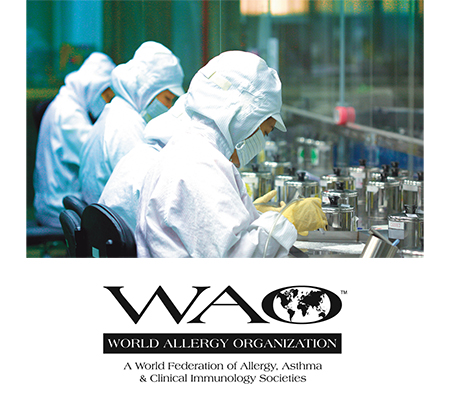 The expert panel s conclusion is that "There is a likely net benefit from using probiotics resulting primarily from prevention of eczema." The World Allergy Organization’s recommends the following: a) using probiotics in pregnant women at high risk for having an allergic child; b) using probiotics in women who breastfeed infants at high risk of developing allergy; c) using probiotics in infants at high risk of developing allergy. If your baby has a high chance of developing allergy, reach out for LACTOGG®’ s GG probiotic, the probiotic strain which has been studied, evaluated and recommended by experts. Does LACTOGG® benefit Mom herself? Not only do newborn babies experience less allergic symptoms, mothers also benefit from taking LACTOGG® during pregnancy. A clinical trial showed that expectant mothers who were highly allergic themselves, experienced less allergic symptoms when they took LACTOGG®’s probiotic strain during pregnancy. Taking a probiotic preparation containing GG probiotic during pregnancy maintained blood sugar levels at a lower level compared to those women who did not take the probiotic preparation. 6 months after delivery, the supplemented women also recorded less risk of becoming overweight ! For more information about the LACTOGG®’s effect on nutrition and weight click here. 
How should LACTOGG® be taken? Before birth of baby: Expectant mother takes 1 capsule of LACTOGG® once a day, beginning at least 2-4 weeks before the expected date of delivery. After delivery: Complete breastfeeding: Mother or baby takes 1 capsule or 1 sachet of LACTOGG® a day until baby is at least 6 months old. Unable to breastfeed: Baby takes 1 capsule or 1 sachet of LACTOGG® a day until baby is at least 6 months old. Using LACTOGG® this way is specifically to help reduce baby’s risk of developing allergy. It is safe for baby to be given LACTOGG® directly even if the infant is exclusively breastfed. Baby can continue to take LACTOGG® longer than 6 months in order for him/her to enjoy its other health benefits. References: Barneston RSC et al. Childhood atopic eczema. BMJ 2002;324:1376-79 Foolad N et al. Effect of nutrient supplementation on atopic dermatitis in children. A systematic review of probiotics, prebiotics, formula and fatty acids. Arch Dermatol 2013:149:350-355 Kalliomaki M et al. Probiotics in primary prevention of atopic disease:a randomised, placebo-controlled trial. Lancet 2001;357:1076-1079 Kalliomaki M et al. Probiotics and prevention of atopic disease – a 4-year follow-up of a randomised placebo-controlled trial. Lancet 2003;261:1869-1871 Kalliomaki M et al. Probiotics during the first 7 years of life: A cumulative risk reduction of eczema in a randomized, placebo-controlled trial. J Allergy Clin Immunol 2007;119:1019-1021 Rautava S et al. Probiotics during pregnancy and breast-feeding might confer immunomodulatory protection against atopic disease in the infant. J Allergy Clin Immunol 2002;109:119-121 Fiocchi A et al. World Allergy Organization-McMaster University Guidelines for Allergic Disease Prevention (GLAD-P): Probiotics. World Allergy Organ J 2015;8:4DOI 10.1186/s40413-015-0055-2 |




